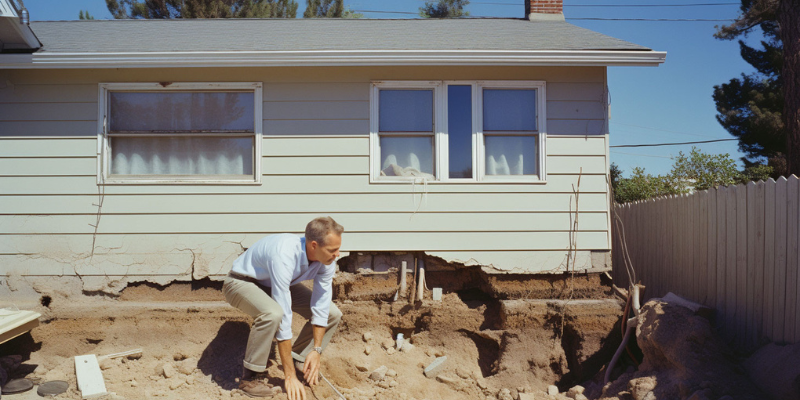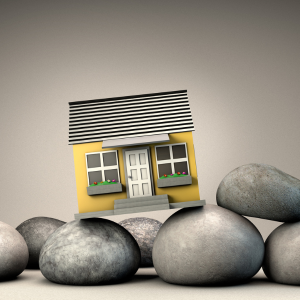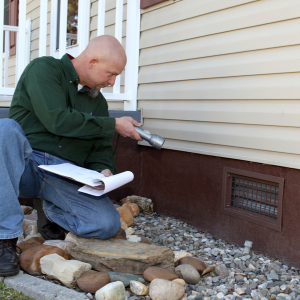
Is It Possible to Sell a House with Foundation Problems in Atlanta, GA?
Foundation problems sound scary, but they won’t ruin your life. Can you sell a house with a wonky foundation in Atlanta? Yes, you can. Will it be exactly like selling a perfect house? Not quite, but honestly, selling any home is a pain anyway.
Atlanta is full of homes with foundation issues because our clay soil works against us 24/7. Buyers around here understand this. They’ve seen it before. Some will still want your house, some won’t.
We’ll walk through how this whole thing works so you can make your best move and close this sale!
Nance Homebuyer buys houses in Atlanta, even those with foundation problems. We offer fair cash deals, handle all the details, and make the selling process quick and stress-free—no repairs or waiting required. Get a reliable offer and move forward with confidence!
Are Foundation Problems Common in Atlanta Homes?
Yes, they’re everywhere. Atlanta‘s clay soil is basically the worst. It swells up when it rains and shrinks when dry, so your foundation constantly shifts around.
Spring brings a lot of rain, and then summer dries everything out—rinse and repeat. Older neighborhoods like Virginia-Highland and Candler Park were built long before anyone figured out how to handle this kind of soil properly, so foundation issues are just part of the territory.
Common Types of Foundation Problems in Atlanta
Atlanta homes deal with a handful of foundation issues repeatedly. Here’s what you’re probably looking at.
Cracks in Foundation Walls
Tiny hairline cracks? Totally normal, don’t sweat it. But if you’ve got horizontal cracks or anything you could stick a pencil into, that’s a problem. Horizontal ones mean the soil outside is shoving your walls around. Those big vertical cracks from the floor up also settle, which isn’t great either.
Bowing or Leaning Walls
This is when your basement or crawl space walls start caving in or tilting. The soil outside is pushing too hard, and your walls can’t take it anymore. It’s pretty serious because it affects the stability of your whole house.
Slab Cracks and Settlement
Many Atlanta homes are built on concrete slabs, and your slab moves with it when the soil underneath decides to move. You’ll spot cracks in the tiles or weird gaps between the floor and walls.
Sometimes one side of your house just sits lower than the other, which is super fun when you’re trying to figure out if you’re dizzy or if it’s actually the floor.
Pier and Beam Issues
Older homes around here have pier-and-beam foundations, and Georgia’s humidity does a number on them. The wooden beams rot out, and the piers sink into our soft clay soil. Your floors start sagging, and everything feels a little off.
Crawl Space Problems
Crawl spaces in Atlanta are basically moisture magnets. The drainage isn’t excellent, the humidity’s always high, and standing water weakens everything holding your house up. Plus, you get wood rot, mold, and bugs that love it.
What Causes Foundation Problems in Atlanta Homes?
Atlanta throws everything at your foundation all at once. Let’s break down why your house is having such a rough time.
Atlanta’s Expansive Clay Soil
Our red clay soil is the main villain here. It expands when it soaks up water and contracts when it dries out, and your foundation just has to deal with it. During wet months, the soil pushes up against your foundation. During dry spells, it pulls away and leaves gaps.
This back-and-forth beats up your foundation year after year until something gives.
Heavy Rainfall and Drainage Issues
Atlanta gets a lot of rain (about 50 inches a year), and most comes in bursts. When your gutters are clogged or your yard doesn’t drain right, all that water pools around your foundation. The soil swells, water seeps into cracks, and your foundation takes the hit.
Poor grading around your house worsens this because water flows straight toward your foundation instead of away from it.
Drought Conditions and Soil Shrinkage
Then summer hits, and everything dries out fast. The soil shrinks away from your foundation and creates voids underneath. Your house settles into these gaps unevenly, which causes cracks and structural movement.
Trees around your property pull even more moisture from the soil because their roots are thirsty, so the problem gets worse if you’ve got big oaks or pines nearby.
Poor Construction Practices
Some Atlanta homes were poorly built from the start. Contractors who didn’t compact the soil properly before pouring the foundation, skimped on drainage systems, or used cheap materials left homeowners with problems that showed up years later.
Homes built in the ’60s and ’70s especially have issues because building codes weren’t as strict back then.
Signs Your Atlanta Home Has Foundation Issues
You might know something’s wrong or notice weird stuff around your house. Here are the big red flags that really show foundation problems:
- Cracks in walls, ceilings, or floors: Especially around door frames and windows.
- Doors and windows that stick or won’t close right: Your foundation shifted, and now nothing lines up.
- Gaps between walls and the ceiling or floor: You can see where things pulled apart.
- Sloping or uneven floors: Put a marble down and watch it roll.
- Cracks in exterior bricks or mortar: Those stair-step cracks are a dead giveaway.
- Water in your basement or crawl space: If it’s always damp, you’ve got issues.
- Chimneys or porches pulling away from the house: They’re literally separating from your home.
- Cabinets or counters that aren’t level anymore: Suddenly, your kitchen looks drunk.
If you see multiple signs from this list, you’ve probably got foundation problems. You need to get serious about what you’re going to do next.
If you see several warning signs, don’t wait for the damage to worsen. Contact us today for a no-obligation offer. We’ll assess your home’s condition and give you a fair, straightforward solution so you can move forward confidently.
Can You Sell a House with Foundation Problems in Atlanta, GA?

Yes, you can. It happens all the time, actually. Foundation problems don’t mean your house is unsellable; they just tell you to be smart about approaching it.
Sure, fewer buyers will be interested, but plenty of people buy homes with foundation issues in Atlanta. Investors love them.
Some regular buyers are okay with it if the price reflects the problem. Cash buyers don’t even blink. You just have to be upfront about what’s happening and pricing your house so buyers know what they’re getting into.
Should You Fix Foundation Issues or Sell As-Is?
If repairs are under $15,000 and you’ve got time and money, fixing them could attract more buyers and a better price. Traditional lenders prefer stable foundations, and most buyers want move-in-ready homes.
Keep all your receipts and warranties because buyers want proof that the work was done correctly.
But selling as-is makes more sense if you’re looking at $30,000+ in repairs, need to sell fast, or don’t have cash.
You’ll take a lower price but skip months of contractor headaches and permit delays. Cash buyers and investors buy as-is homes constantly.
How Much Do Foundation Problems Affect Your Home’s Value in Atlanta?
Foundation problems usually reduce a home’s value by 10% to 15%, sometimes more if severe.
A house worth $350,000 in perfect shape might only sell for $300,000 to $315,000 with foundation issues. The hit depends on how severe the damage is and what repairs will cost. Minor cracks don’t scare buyers much as bowing walls or primary settling.
Buyers will factor repair costs into their offers, so they ask you to cover what they’ll spend fixing it.
If homes in your neighborhood sell fast, you might lose less value because buyers still want to live there. But expect lower offers across the board when foundation problems are in play.
Foundation Repair Cost in Atlanta, GA
Foundation repairs in Atlanta vary widely depending on the problem. Sealing minor cracks costs $250 to $800. Mudjacking to lift a settled slab costs $500 to $2,500. Bowing wall repairs with carbon fiber or steel beams cost $4,000 to $15,000.
Foundation piering, which is needed for severe settling, costs $1,000 to $3,000 per pier, and most homes need 8 to 10 piers at a minimum. So, you’re looking at $8,000 to $30,000+ for major stabilization work.
Don’t forget the extras. Structural engineer inspections cost $300 to $800. Building permits run $100 to $500. Crawl space waterproofing and vapor barriers add another $2,000 to $10,000.
If tree roots are causing problems, removing the tree costs $500 to $2,000. These small costs pile up quickly, so you must budget more than just the contractor’s quote.
How to Sell a House with Foundation Problems in Atlanta, GA

Selling a house with foundation problems takes some strategy. Here’s how to actually get it done.
Step 1: Get a Professional Foundation Inspection
Hire a structural engineer, not just a general contractor. You need someone who can tell you precisely what’s wrong and how serious it is. This inspection will cost you $300 to $800, but it’s worth every penny because you’ll have a real report you can show buyers.
Buyers trust engineer reports way more than your word. Plus, having documentation upfront stops a lot of arguments later. You’ll actually know what you’re dealing with instead of just guessing.
Step 2: Obtain Repair Estimates from Licensed Contractors
Get quotes from at least three licensed foundation repair contractors. Don’t just call one guy and take his word for it. Prices vary a lot, and you want to know your options.
Please make sure the contractors are actually licensed and check their reviews. Some foundation repair companies are total scams, so always do your homework.
Keep all these estimates even if you decide not to fix anything. Buyers will want to see them so they know what they’re getting into.
Step 3: Decide Your Selling Strategy
Now you’ve got to make the call: fix it or sell as-is. Look at your repair estimates and compare them to what you think you’ll lose in home value if you don’t fix it.
If you’re going to spend $20,000 on repairs but only get an extra $15,000 in sale price, the math doesn’t work. But if you can pay $8,000 and get $20,000 more, that’s a win.
Also, consider the timing. If you need to sell next month, you won’t have time for repairs.
If You Choose to Repair
Hire a licensed contractor with good reviews and make sure everything’s permitted. Save every receipt, warranty, and piece of paperwork. Also, remember to take before-and-after photos.
When listing your house, you should market it as “foundation recently repaired with transferable warranty,” which becomes a selling point. Buyers love knowing the problem’s already been handled and that they won’t have to deal with it.
If You Choose to Sell As-Is
Be completely upfront in your listing that the house has foundation issues and you’re selling it as-is. Don’t try to hide or downplay it; it’ll blow up in your face later.
Price the house low enough that buyers see value even with the repairs needed.
Note that you’re targeting Georgia cash buyers, investors, and people who are not scared of a project. These buyers exist; you just need to find them.
Step 4: Comply with Georgia’s Disclosure Requirements
Georgia law says you must disclose any known material defects; foundation problems definitely count. Fill out your seller’s disclosure form honestly and list everything you know about the foundation.
If you’ve had inspections or repairs done before, mention those, too. Lying on your disclosure can get you sued after closing, and that’s way worse than just being honest up front.
Buyers appreciate transparency, and it protects you legally.
Step 5: Price Your Home Appropriately
If you’re selling your home as-is, price it at least 10% to 15% below comparable houses in your neighborhood. If the damage is severe, you might need to go lower.
Look at what similar homes sold for recently and subtract your estimated repair costs. You want buyers to see the deal immediately when they look at your listing.
If you fixed the foundation, you can price closer to market value. However, expect some pushback because buyers know the house had problems before.
Step 6: Market to the Right Buyers
Don’t waste time with first-time homebuyers or people using FHA loans. They’re not going to be able to buy your house. Target cash buyers, real estate investors, and people looking for fixer-uppers.
List your house on investor sites and let local house-flipping companies know it’s available. In your listing, be clear about the foundation issues and necessary repairs.
The right buyer won’t be scared off. They’ll see it as an opportunity.
What Will Happen If You Don’t Disclose Foundation Issues?

You’ll get sued. Seriously, don’t play around with disclosure laws. If you know about foundation problems and don’t tell the buyer, they can come after you for fraud. You’ll end up paying way more than you would have if you’d been honest.
Even if the buyer’s inspector somehow misses the issues, they’ll find out eventually when things get worse. Then you’re looking at lawsuits, paying for their repairs, legal fees, and possibly punitive damages.
Georgia courts take seller disclosure violations seriously, and judges always side with buyers. Just tell the truth and save yourself the headache.
Potential Issues When Selling a House with Foundation Problems
Now, the annoying stuff that’s probably going to happen. Here’s what you’re up against.
Financing Challenges for Buyers
Most banks won’t lend on a house with a messed-up foundation. That means FHA, VA, and USDA loans are off the list. They’re super picky about structural stuff. So even if someone loves your house, their lender will shut it down.
The appraiser will show up, see the foundation issues, write them in the report, and the underwriter will say nope. This is precisely why cash buyers are your people. They don’t care what some bank thinks because they’re not using a bank.
Appraisal Problems and Lender Requirements
Let’s say you find a buyer whose lender is willing to look at it. Cool. But then the appraisal comes back and tanks the whole thing.
Appraisers have to report structural damage, and suddenly, your house won’t appraise for the buyer’s offer. The lender freaks out and demands repairs before they’ll close.
Some will do repair escrows, where money is set aside for later, but most just bail. This is why your price is low from the start. It gives you a cushion when the appraisal comes in under.
Dealing with Low Offers and Extended Time on Market
Your house is gonna sit there. Other homes in your neighborhood will sell fast, and yours won’t. Buyers will throw insultingly low offers because they know you’re stuck. We’re talking 20% to 30% below what you hoped for, and yeah, it sucks.
The sad thing is, every month your house sits costs you money. You must pay for mortgage, utilities, insurance, and taxes. Sometimes, grabbing a lower offer early beats waiting for months, hoping someone will pay more. Do the math on what waiting actually costs you. We buy houses in Atlanta and other cities in Georgia, so if you’re ready to move on, reach out today and get a fair cash offer without the wait.
Buyer Inspection Objections
Every remotely serious buyer will get an inspection, and that inspector will write up your foundation like it’s the end of the world. Even though you told them everything, seeing it typed out in a report makes people panic.
They’ll come back asking for repairs, money off, credits, or they’ll just walk. Don’t take it personally. Have your engineer’s report and repair quotes ready, and show them you’ve been straight with them the whole time.
The less surprised they are by the inspection, the less likely they are to bail.
Negotiating Repairs, Credits, and Concessions with Buyers
So you’ve got a buyer who’s actually interested. Now you must figure out how to make the deal work when everyone knows your foundation’s shot.
Offer Repair Credits at Closing
Repair credits mean you hand the buyer cash at closing, and they fix it themselves. This is great for you because you don’t have to deal with contractors, permits, or anything else. They pick who does the work and when.
The only problem is that some lenders cap credit, usually 3% to 6% of the sale price. If your repairs cost more than that, you’ll have to drop your price and stack them.
Adjust the Sale Price
Honestly, this is the easiest way. Do repairs cost $15,000? Drop your price to $15,000 or more. Done. This makes financing cleaner because the loan amount is lower, and there’s no weird credit math.
The buyer knows exactly what they’re paying and what they need to fix. It’s simple, which is why most deals end up here. Less messy, fewer moving parts.
Make Repairs Before Closing
Sometimes, the buyer wants your house, but their lender won’t budge without repairs. If you have the cash and the time, you can fix it before closing.
Get it done, get it permitted, get it inspected, and then close. This process takes the longest and costs the most upfront, but it can save a deal about to die.
Just make sure you get exactly what the lender wants fixed in writing. You don’t want to do the work and then have them demand more stuff.
Frequently Asked Questions About Selling a House with Foundation Problems in Atlanta
Does homeowners’ insurance cover foundation repairs in Atlanta?
Probably not. Most homeowners’ insurance doesn’t cover foundation damage from settling, soil movement, or general wear and tear, which causes foundation problems in Atlanta.
Your policy might cover it if the damage came from a sudden event like a burst pipe or fire, but gradual damage from our clay soil and weather? That’s on you. Earthquake and flood riders might help if you have them, but standard policies won’t touch foundation issues.
How long do foundation repairs take in Atlanta?
Once the contractor starts, most foundation repairs take 2 to 5 days. Minor crack sealing might be done daily, but major piering jobs could take a week. However, getting permits and scheduling contractors can add weeks to the timeline.
If you’re trying to close quickly, foundation repairs might delay your sale by a month or more, depending on how busy contractors are.
Can I sell my house if the foundation is still settling?
Yes, but you need to be upfront about it. Active settling is a bigger red flag than settled damage already stabilized. Buyers and lenders get nervous when the foundation is still moving because it means the problem’s not done yet.
You’ll have a harder time finding buyers, and you’ll definitely take a bigger hit on price. Cash buyers are usually your only real option if settlement is ongoing.
Will buyers assume other problems exist if the foundation is bad?
Yep, they will. That’s for sure. Buyers see foundation problems and start worrying about everything else, including plumbing, electrical, roof, and HVAC. They’ll assume the whole house has been neglected, even if those things are fine.
This is why pre-listing inspections help. You can prove that it’s just the foundation and everything else works. But yeah, foundation issues make buyers suspicious of the entire property.
What’s the difference between cosmetic cracks and structural damage?
Cosmetic cracks are thin hairline cracks less than 1/8 inch wide that occur when concrete cures and settles. They’re usually vertical and don’t grow.
Structural cracks are wider than 1/4 inch, horizontal, stair-stepped, or getting bigger over time. If you can fit a credit card in the crack, it’s probably structural. If water seeps through or the wall is bowing, it’s structural. When in doubt, get a structural engineer to look at it.
Should I get multiple opinions on foundation repairs?
Foundation repair companies vary widely in diagnosis and price. One contractor might say you need $30,000 in piering, while another says $8,000 in crack sealing will do it. Get at least three quotes from licensed contractors and consider paying for an independent structural engineer’s opinion before you hire anyone.
Engineers don’t have skin in the game like contractors do, so their assessment is usually more honest.
Key Takeaways: Selling a House with Foundation Problems in Atlanta, GA
Foundation problems don’t mean you’re stuck with your house forever. Atlanta’s clay soil makes foundation issues super common, so local buyers expect it. Fix it if you can afford to and have time, or sell as-is if you need to move fast.
Also, be honest about everything, price it right, and target cash buyers or investors who want houses with problems. You’ll get lower offers, and deals will fall through, but someone will buy it. If you’re ready to skip the headache and sell your Atlanta house with foundation problems fast, Nance Homebuyer can help. We buy houses in any condition, including foundation issues. Call us at +17707582729 or make a fair cash offer and close on your timeline, no repairs, no waiting, no stress!
Helpful Atlanta Blog Articles
- Selling a Probate House in Atlanta, GA
- Can I Sell My House if It is in Foreclosure in Atlanta, GA
- How to Sell an Investment Property in Atlanta, GA
- Paperwork for Selling a House by Owner in Atlanta, GA
- Navigating an Inherited House with Siblings in Atlanta, GA
- Selling a House with Foundation Problems in Atlanta, GA
- How Long After an Appraisal Can You Close in Atlanta, GA?
- How Long Can a Seller Stay in the House After Closing in Atlanta, GA
- Can Heir Property Be Sold in Atlanta, GA?
- Can You Sell a House As Is Without Inspection in Atlanta, GA?
- Do I Need a Lawyer to Sell My House in Atlanta, GA?
- Tax Implications of Selling Home in Atlanta, GA
- Sell a House with Title Issues in Atlanta, GA
- Sell a House with a Squatter in Atlanta, GA

